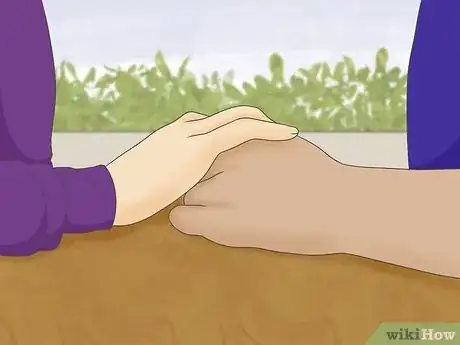This article was co-authored by Klare Heston, LCSW. Klare Heston is a Licensed Independent Clinical Social Worker based in Cleveland, Ohio. With experience in academic counseling and clinical supervision, Klare received her Master of Social Work from the Virginia Commonwealth University in 1983. She also holds a 2-Year Post-Graduate Certificate from the Gestalt Institute of Cleveland, as well as certification in Family Therapy, Supervision, Mediation, and Trauma Recovery and Treatment (EMDR).
This article has been viewed 41,386 times.
Fighting with your boyfriend is never fun, and sometimes making up with your boyfriend can feel even worse. You might need to apologize, confront unpleasant feelings, or find a compromise together. None of these are easy, but all of them will make your relationship better in the long run. Making up with your boyfriend after a fight will help you both move forward and become stronger, more compassionate partners.
Steps
Cooling Off and Apologizing
-
1Tell him you need time to cool down. When you’re still in the heat of the argument, you’re not in a good mental place to start trying to make up; in fact, you’ll probably just get even more frustrated. Instead, take a break from your boyfriend and give him a break from you. Go to different rooms for a while and let yourself calm down.[1]
- You can say something like, “OK, I’m too upset to talk about this right now. I need time to cool off.”
- When you’re alone, close your eyes and take deep breaths. Slowly start to let go of your anger and frustration and look at the problem calmly.
- Take as long as you need to cool down. You should wait for at least 10 minutes, but feel free to take more time if you need it.
-
2Look at things from his perspective. People tend to get defensive in arguments, taking criticism personally and blaming their partner so they don’t have to confront their own actions. While you’re cooling off, break down your defensive barrier by looking at things from his point of view.
- Ask yourself how you would feel if he acted towards you the way you did towards him. What do you think he’s feeling right now? Own up to your actions if you think you might be the cause of any pain or upset.
- For example, if you got mad at your boyfriend for ignoring your texts, consider his schedule and feelings. Did he have a busy day? Maybe he wanted to reply, but just didn’t have the time. If you yelled at him, it may have made him feel frustrated and blamed.
Advertisement -
3Give him a sincere apology, if it’s warranted. When you’re ready to talk again, go in with a new attitude. If you’re in the wrong in any way, apologize, and be specific about what you’re apologizing for. Tell him that you understand why he’s feeling this way, and that you’re sorry.[2]
- For example, you might say, “I’m sorry I said those things about your friends. I might not like them, but I know you do, and I shouldn’t have been so mean.”
- Your boyfriend might be in the wrong too, but that doesn’t mean you can’t work on your own actions, too. For example, if you got angry at your boyfriend for forgetting about a date, you might apologize for yelling at him or refusing to accept his apologies.
-
4Use “I” statements to explain why you were feeling upset. Once you’ve owned up to your own actions, explain your feelings. Tell him what caused you to do or say something bad, or caused you to get in the fight in the first place. Use “I” statements so you don’t inadvertently push the blame on them. Focus on opening up to your boyfriend and showing him how you feel, not attacking him for making you feel that way.
- For example, you could say, “It’s just that when I see you spending more time with your friends than you do with me, I feel like I’m not your first priority and that really hurts.”
- You could own up to your behavior during the fight by saying something like that, “I get defensive when I feel like you’re seeing the parts of me that I don’t like as much.”
- Take as much time as you need to calmly talk through your feelings. Helping him to see things from your perspective will give him more compassion in understanding where you’re coming from.
-
5Give him time to talk. Once you’ve explained how you feel, give him the chance to talk. Ask him how he feels and what made him react the way he did. It might not be easy for him to open up, so be kind, compassionate, and patient. Show him that he can be honest and vulnerable with you and that you won’t judge him for anything he’s feeling.
- You could say, “Can you tell me where you’re coming from?” or “I know I might have been hard to talk to earlier, but I really want to hear things from your point of view.”
- Let him talk without interrupting and give him the same respect as he showed for you. Ask questions and be empathetic by saying things like, “I didn’t realize you were feeling that way. That must’ve been really hard. I’m sorry.”
Finding a Solution
-
1Identify the problem that started the fight. After giving each other a sincere apology, work together to recall what started the fight. Talk about how it connected to any other issues that came up. Instead of pushing the issue under the rug, try to fix it.[3]
- Avoid getting worked up about the fight again while you discuss it. Stay calm and remember that you’re trying to resolve a problem, not restart one.
- If you don't feel like you're ready for a calm discussion, it's okay to postpone it until you do feel ready.
- For example, you might have ended your fight by saying that he doesn’t care as much for you as you do for him. When you trace it back, though, you might see that it started because he stayed out just an hour later than he’d planned.
-
2Discuss what you both wanted and why it became an issue. Fights between couples often start with something small, then absorb other issues. Now that you’ve worked out the primary cause of the argument, tell your boyfriend what you wanted out of that issue and why you got upset. Make sure you’re not rehashing the argument. Instead, talk about it from a calmer perspective, look more closely at your feelings, and figure out a better way to work through them.[4]
- For example, you might have started by fighting about a date your boyfriend missed. What made you really upset, though, was feeling like he wasn’t as invested in your relationship as you were. This made you feel unwanted and defensive.
- Let your boyfriend do the same. Ask him what became an issue for him and how it made him feel.
-
3Negotiate a compromise that will work for both of you. Come together to find a solution that takes both of your perspectives and opinions into account. Be willing to give a little or work on your own issues as long as he does the same. Finding a compromise might be difficult, but it’s the best way to make sure that the issue doesn’t reappear in another fight.[5]
- For example, if you got jealous of your boyfriend talking to another girl, a compromise could be him limiting conversations with other girls while you work on confronting the roots of your jealousy, like insecurity.
- Focus on moving forward, not starting another argument on how to find the best solution. Listen to what he has to say. Be willing to give a little and ask that he does the same.
- If talking about a compromise makes you feel upset again, tell him you need to take a break and finish the discussion later. Say, "I'm feeling really overwhelmed right now, so I need to take a moment to myself. Let's pick this conversation up later."
-
4Find a larger lesson from the argument so that it doesn’t happen again. You can get something positive out of an argument if you both learn a lesson from it. Once you’ve agreed on a solution, ask yourself if any deeper issues came up during the argument. Talk about them in a compassionate, calm way.[6]
- For example, if you had an argument about doing the dishes, you might solve it by creating a schedule. Then, talk about any deeper issues, like the feeling that you’re doing more chores than he is or vice versa.
- Look for patterns in your arguments as well. If you’re always getting into fights about similar things,it’s a sign that there’s a deeper issue at work.
- You might also learn about your different arguing styles and how you can make them more constructive and less hurtful in the future. For example, your boyfriend might not like it if you blame him for everything, or you might find it hurtful when he refuses to talk.
-
5Agree to disagree if the problem doesn’t have a clear solution. Not every argument has a cut-and-dry solution. If your argument is about things that neither of you can change, like a value system, decide if that’s a dealbreaker for you. If you care enough about your boyfriend to weather this difference together, agree to respect each others’ opinions and move forward.[7]
- For example, if you and your boyfriend got into an argument about politics, there may be very little you can do to find a compromise or solution. You can agree to respect each other’s opinions, or simply avoid the topic, if it’s not a dealbreaker for you.
Moving Forward and Arguing Constructively in the Future
-
1Do something kind for each other to heal any wounds. Once you’ve both apologized and worked towards a solution, help the healing process by doing something nice for each other. Hug, offer to cook each other a meal, or put on a movie you both love and cuddle up on the couch together. Showing each other kindness after a fight is a great way to remind you why you care about each other.[8]
-
2Try mindfulness meditation to keep your cool during and after a fight. Negative thoughts can take over during and after a fight, making it hard to make up. You can work on controlling your thoughts during fights by trying mindfulness meditation. Set aside 5-10 minutes a day to sit in a quiet room and settle your mind. Take deep breaths and detach from your day. Focus on the present moment and recognize that your thoughts are fleeting and have no control over you.[9]
- Recognize when you’re having a negative feeling during a fight, but tell yourself that it doesn’t have to take over. See the thought, accept it, and move on calmly.
- This practice will help you recognize and accept your feelings, even the negative ones, so that you don’t take them out on your boyfriend.
-
3Discuss what you can improve in your relationship, but don’t blame. The next time you get into an argument with your boyfriend, avoid criticizing or blaming him personally. It’s OK to complain about your relationship from time to time, but coming at it from a combative angle is a sure way to start another argument.[10]
- For example, if you want to talk about how you and your boyfriend don’t go on dates very often, avoid saying something like, “You never want to take me out anymore.” Instead, try, “We should go out for dinner this weekend. I feel like it’s been forever!”
- Avoid using words like “always” or “never,” as well, which blow situations out of proportion and put him in a place of blame for a major issue.
-
4Take responsibility instead of getting defensive. Getting defensive during an argument can lead you to throw the blame back on your boyfriend. When he gets defensive in return, you can create a blame cycle that’s hard to break out of. The next time you get in an argument, pay close attention for any feelings of defensiveness that come up for you. Before you retaliate, really consider if you could be in the wrong and what you could do to improve.[11]
- For example, if your boyfriend points out that you’ve been spending a lot of time at work lately, you might respond defensively by saying that he spends more time with his friends than he does with you. Not only does this not solve the issue—it’ll also make your boyfriend defensive in return.
- Instead, take his opinions and observations into account. You might not be able to decrease your time at work, but you can give him more attention and affection when you are together.
- If you find yourself in a loop of defensive statements, take a break from the conversation so you can center yourself. Say, "I don't think this conversation is productive right now. Let me go clear my mind and we can talk later."
-
5Focus on what you love about your boyfriend, not what bugs you. If you’re always thinking negatively about your boyfriend or complaining about him, you’re setting yourself up to get into big fights. Instead, use your mental energy to think about what you love about him. Ask yourself: What does he add to the relationship? What does he do that makes you smile?[12]
- In focusing on your boyfriend’s best qualities, you can create a culture of appreciation that fosters love instead of anger or contempt.
- If you’re finding it hard to come up with reasons why you care about him, you may want to reexamine your relationship on a deeper level. You want to be with someone who makes you happy, not annoyed or angry.
- Make a habit of expressing your gratitude to him for no reason. For instance, give him compliments every day and do something nice for him once a week. Hopefully, he'll return the gesture. This will help you have a more positive outlook on your relationship.
-
6Avoid giving him the silent treatment. By ignoring your boyfriend or giving him one-word answers, you’re disengaging from an argument completely. This eliminates the possibility of a solution and will only frustrate your boyfriend even more. When you’re feeling overwhelmed by the negativity in the argument, don’t just shut down without warning. Instead, tell your boyfriend that you need a break. Take some time to calm down, then come back to the conversation when you’re ready.[13]
- Make sure that he knows you’re not trying to avoid the argument or give him the cold shoulder. Say something like, “I’m not ignoring you or giving you the silent treatment. I just need to get away for a little bit and think.
References
- ↑ https://www.psychologytoday.com/us/blog/fixing-families/201806/after-argument-the-right-way-make
- ↑ https://www.psychologytoday.com/us/blog/fixing-families/201806/after-argument-the-right-way-make
- ↑ https://www.psychologytoday.com/us/blog/fixing-families/201806/after-argument-the-right-way-make
- ↑ https://www.bustle.com/articles/65007-6-ways-to-make-up-after-a-fight-no-matter-how-bad-it-was
- ↑ https://www.bustle.com/articles/65007-6-ways-to-make-up-after-a-fight-no-matter-how-bad-it-was
- ↑ https://www.psychologytoday.com/us/blog/fixing-families/201806/after-argument-the-right-way-make
- ↑ https://www.bustle.com/articles/65007-6-ways-to-make-up-after-a-fight-no-matter-how-bad-it-was
- ↑ https://www.bustle.com/articles/65007-6-ways-to-make-up-after-a-fight-no-matter-how-bad-it-was
- ↑ https://www.psychologytoday.com/us/blog/our-empathic-nature/201411/how-stop-fighting-your-partner
- ↑ https://www.psychologytoday.com/us/blog/between-you-and-me/201506/4-things-you-cant-do-when-you-argue-your-partner
- ↑ https://www.psychologytoday.com/us/blog/between-you-and-me/201506/4-things-you-cant-do-when-you-argue-your-partner
- ↑ https://www.psychologytoday.com/us/blog/between-you-and-me/201506/4-things-you-cant-do-when-you-argue-your-partner
- ↑ https://www.psychologytoday.com/us/blog/between-you-and-me/201506/4-things-you-cant-do-when-you-argue-your-partner
About This Article
To make up with your boyfriend, first take some time to calm down and gather your thoughts. Then, start the conversation by apologizing and explaining how you were feeling. Give him the chance to apologize and explain his perspective as well. Then, pinpoint the cause of the fight, such as a missed date, and work together to find a solution. Address any deeper issues that might have come up, like feelings of neglect or fear, and show each other kindness to heal any lingering hurts. However, delay the conversation if don't think you can talk calmly. To learn how to have less hurtful, more constructive arguments in the future, read on!











































































